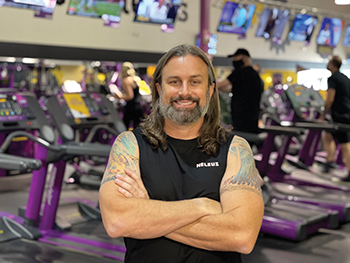Mantle Cell Lymphoma Survivor
When it comes to cancer, this survivor is “crushing it”

As an avid weightlifter, body builder and biking enthusiast, Richard Bagdonas leads a healthy life-style. A Stage IV mantle cell lymphoma diagnosis at 45 shocked him. He joined an immunotherapy clinical trial and today he is considered to be in complete metabolic remission. He is passionate about being a patient advocate and offers support to others facing a cancer diagnosis.
Odd as it sounds, Montezuma’s revenge helped me to discover I had mantle cell lymphoma. While on vacation with my family in Mexico, I ate some fruit that had the bacteria that causes the condition. When the discomfort continued after we returned home, I called my doctor, who referred me to a gastroenterologist. He performed a colonoscopy and found a snippet of inflammation that he sent to pathology. But he felt everything else looked good.
After the colonoscopy, my symptoms persisted. Three weeks later, the doctor called and wanted me to come into the office right away. Not realizing the seriousness of the situation, I thought I’d set up an appointment for two weeks later, but he insisted he needed to talk to me. He said I had pulled the golden lottery ticket because they had figured out that I had lymphoma, specifically mantle cell lymphoma. I was confused. I wasn’t sure why having lymphoma was lucky. No one feels lucky to get cancer.
He explained that the sample he took was examined by the pathology lab and they found cells they didn’t recognize. They had another lab take a look, and they couldn't identify them either. The sample was then sent to a lab in Boston where they identified the strange cells as mantle cells. The theory was that because lymphoma is a disease of the lymphatic system, mantle cells were created and then drained into my gut, and the cells were found in my colon. It was lucky and unusual that they’d been able to determine this through a colonoscopy.
Once I heard the diagnosis, my world collapsed. I read online that the life expectancy was three to five years and it was a fast-growing cancer. I didn’t want to accept this. Friends and family helped me search for a specialist, and we found an expert in mantle cell lymphoma. I called him and was able to see him in person four days later.
The specialist performed multiple tests and concluded I had Stage IV mantle cell lymphoma that had spread to my bone marrow and lymph nodes in my neck and groin. He told me I could do the standard treatment at the time, but I’d likely only have 10 years. Being that I was still a relatively young man at 45 years old, he recommended I explore a clinical trial that was testing two immunotherapy drugs. It was starting in a few months.
Before joining the trial, I sought a second opinion with another oncologist. She told me she could only offer me the current approved treatment and confirmed that my best option was to join a clinical trial. With the help of my specialist, I enrolled as the first patient.
During the trial, I focused on having a positive mindset, used affirmations and meditation, and continued to work out and eat healthy. In meditation, I would focus on believing that I was past the cancer and was cured, that my body just needed to catch up. Throughout the trial, I never had any adverse symptoms.
When the second month of treatment ended, they performed a PET and discovered I was in complete metabolic remission, meaning tests could not find any lymphoma in my body. The trial then put me on a targeted therapy to help my body get rid of any remaining “dead” lymphoma cells. Thankfully, I responded well and went on with my life.
Now I am a spokesperson for the hospital that conducted that clinical trial. I share my experience to inspire others to consider clinical trials. One of the highlights of my life was meeting Jim Allison, Ph.D., who won the Nobel Prize in Physiology or Medicine for developing a type of immunotherapy for treating cancer.
I recommend patients consider participating in clinical trials 110 percent. I think patients should look for one in the beginning because some trials require that you haven’t had a previous treatment. And, it’s a good idea to research this option before you need it.
Having support is critical, and surrounding yourself with people with positive energy is so helpful. Keeping a positive attitude is also important. I offer my support to give back to others. To share some of my tips for keeping healthy during treatment, I wrote a book, Fit for any Battle. I believe that our bodies have to be as fit as possible to be ready for treatment, so strengthening it beforehand is a great strategy. Before starting treatment, try to be in the best health possible. And you don’t have to be a weightlifter like me to get the benefits of exercise during cancer treatment. Anyone who has recently been diagnosed with cancer can contact me at richard@fitforanybattle.com for a free copy of my book.
With the help of clinical trials and tons of support, I was able to crush cancer.


